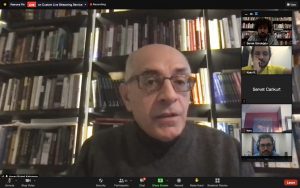Prof. Dr. Kahraman: “Can Divan literature be returned to the collective consciousness with a new contract?”
 Samsun University (SAMU) Art and Thought (DÜSAM) hosted Prof. Dr. Hasan Bülent Kahraman under the moderation of Servet Gündoğdu. In the program on an online platform, “Being a Tenant in the House of Literature: Where Did Divan Literature Go?” with his speech under the title, Kahraman explained his evaluations on the subject.
Samsun University (SAMU) Art and Thought (DÜSAM) hosted Prof. Dr. Hasan Bülent Kahraman under the moderation of Servet Gündoğdu. In the program on an online platform, “Being a Tenant in the House of Literature: Where Did Divan Literature Go?” with his speech under the title, Kahraman explained his evaluations on the subject.
“One of the most important concepts in the history of Western consciousness is the contract”
Hasan Bülent Kahraman said, “Divan Literature has occupied one side of my mind to some extent since my childhood. Divan Literature can be handled in many aspects. Especially in today’s developed and expanded theoretical world, this will be quite like this. While thinking about this subject, I found the concept of “Being a Tenant in the House of Literature” later. I got a little bit of its charm myself. Well, what is the tenancy? I also lived as a tenant for a long time. So I am 64 years old. I lived as a tenant until I was 60. This is a matter of leasing, a contract. As you know it is a contract with one of the important concepts of the Western world, Western consciousness history, Western social history, political history. Again, it is a very interesting point for me. I was amazed at his time that he reached his end. I thought of it as a new literary convention to present the title of this talk.
“Only Tanpınar touched on the issue of the formation of pleasure”
Kahraman says, “Only Ahmet Hamdi Tanpınar an occasional slight pleasure subject, raised the issue of the formation of pleasure. Of course, because he lived through periods of great degradation, and because he constantly had a fluctuating world of mind between the West and the society he lived in, he thought about the question of taste and when people were invited to think. However, we have not addressed this. As I said, the accumulation of intellectual social theory in Turkey, the accumulation of intellectual history has not yet come to this stage. But this is a very important issue. There are multi-term analyzes that prepare this, that is, the pleasure, the transformation of pleasure. On the one hand, what Roland Barthes said about fashion is to some extent related to this. Of course, it is related. But for him, there is Bourdieu, who looks at it from a more macro perspective, of course, which I will mention in this talk. Bourdieu is a sociologist and generally thought about pleasure.
Let me talk about a name that is not remembered. French people are interested in this subject. For example, Régis Debray, as there is a tasteful, hedonistic side of reality, as well as concerns about reading cultural definitions elsewhere, are important and predominant.
“Admiring Divan literature seems to be a matter of taste today”
“Can Divan literature be returned to collective consciousness with a new contract? We are not in an effort in social or cultural engineering, but we know a basic concept of cultural life. The name of this concept is “classic”. When we look at the concept of classical or canon in France, England, and even America, it is out of the question not to know a certain education class. Here, the positivist separation of professional fields is not enough to change the matter. You may or may not know a classic for the French. Those who don’t know are second-class people. Let me use the term of Bourdieu, what he calls reciprocity, is the class-pleasure relationship here an eternity for us? Habitus is a kind of collective consciousness.
It could be called the universe of lifestyles. This universe makes the relationship between class and pleasure a concrete structure. Is it a matter of taste today, or is it a component of cultural capital? Looking at the current situation, it is understood that this remains only a matter of taste and cannot be related to cultural capital. “If we are looking for a contract and this contract will be a social contract, then can it be a component of cultural capital, too?
“Being a Tenant in the House of Literature: Where Did Divan Literature Go?” titled talk is ended with the active participation of the audience, questions, and contributions.
